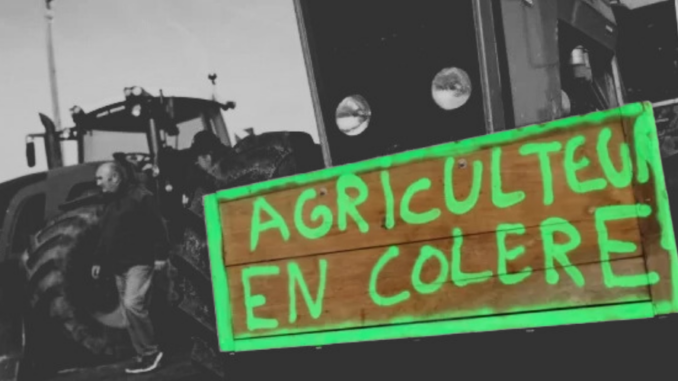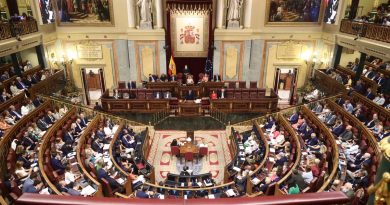France: Farmer mobilization
The FNSEA hit the brakes before starting.
By Gérard Florenson
TheNational Federation of Farmers’ Unions (FNSEA by its French acronym) appears to have been successful in its demining operation: three days or so of demonstrations with some minor blockades that served to vent the anger of the great mass of peasants, and then a return to calm with very few outbursts. Nevertheless, was not able to completely control the situation in all departments because some of the mobilized farmers were not satisfied with this limited action. Thus, so as not to be overwhelmed, The FNSEA asks that the tractors go out again, placing a little more emphasis on agricultural income, but without ceasing to implore the government to negotiate.
The farmers' anger is based, just like during the January protests, in the difficulty of obtaining sufficient income from their activity despite the long work hours, difficulty aggravated by a debt burden that strangles them and puts many of them on the brink of bankruptcy. It must be said that, despite the promises, the situation remains the same and that the exploitations continue to be squeezed both upstream and downstream. Upstream, by seed suppliers, livestock feed and agricultural equipment, and of course by the banks, who do not grant loans for free; downstream, by those who set prices and always make them lower, the agri-food industry, supermarkets and exporters. It should be noted that many of these exploiters are so-called cooperatives, which in reality are large groups that function as capitalist companies, and within which the leaders of the FNSEA often occupy well-paid executive positions.
The rejection of free trade agreements between the European Union and Mercosur is being highlighted, inclusive by the Peasant Confederation, whose main concern, judging by their website, seems to be this. Agricultural unions want to pressure Macron to block them. Some farmers, in particular the ranchers, are legitimately concerned about the deal being debated, and this must be taken into account instead of being limited to a double abstract denunciation of liberalism and protectionism.
The maneuvers of the FNSEA
The FNSEA deliberately limited the scope of the mobilization to appear to echo the farmers' anger that also affected its members., who, like the rest of the profession, They were tired of the broken promises that had justified the end of the mobilizations in January. She anticipated the situation for fear of being overwhelmed by a spontaneous movement that was difficult to control and that could serve as a springboard for competition.. The FNSEA needed to make people forget the lackluster role played by its leaders in an orderly end to the conflict when nothing tangible and, so, show your teeth a little, just a little, and get into the union game. This very moderate resurgence of combativity was essential because in January the elections to the agrarian chambers and the Coordination Rurale were held., a rival right-leaning union that aims to be closer to the agrarian base, runs the risk of taking control of some of the cameras currently managed by the FNSEA. Nevertheless, Chamber management is not just a matter of prestige: there are funds to manage and, so, what to direct, financial and human resources that the union can use, and the electoral system gives a safe presentation to the list that remains at the top, reducing the others to the minimum expression.
What became clear is that the FNSEA had established its operation in close collaboration with the government. Not too much damage, nothing that could seriously affect economic activities, a mobilization limited in time, definitely, a responsible unionism that simply wanted to point out the difficulties of the agricultural world. The message has been heard by the government, who will do what he can in response to "limitations" and "bureaucracy", but not, Of course, on agricultural income, because there is little you can do, since it cannot challenge the interests of the capitalists; and the FNSEA only raises it anecdotally, without making the slightest concrete claim.
The government needs the FNSEA as much as the FNSEA needs the government. In the last elections, a large part of the rural world voted for the Rassemblement National, breaking with the traditional center-right vote, and a movement by the Coordination Rurale could go in the same direction, taking into account that progressive unions, Peasant Confederation and MODEF, They probably won't play a central role in this election. Therefore, has to help the FNSEA to resist, to restore her image a little and to be able to affirm that she continues to be listened to by the rulers. This may involve some concessions that do not affect the operation of the system.
A multifaceted "union"
Who knows anything about the history of the FNSEA, immediately think of the word “co-management”, the co-management of agricultural policy between the main union and successive governments. This collaboration, that goes far beyond the classic moderate and respectful unionism, was firmly established in 1960 when the new and young leaders of the FNSEA met with the Gaullist technocrats to negotiate the "modernist pact" proposed by Minister Pisani: high-yield agriculture, market oriented, that it was no longer practically self-sufficient, that would continue to be family-owned but with fewer farmers and that would allow young people to become independent. This was perfectly in line with the stated objectives of the common agricultural market, in which France would have an important place due to its potential.
This collaboration served the Gaullists, who wanted to win over a largely Christian Democratic rural electorate, with the exception of some "red" zones, and some union members occupied good positions on their lists. F. Guillaume, Secretary General of the FNSEA, He was appointed Minister of Agriculture in 1986…
From the point of view of the FNSEA, apart from some elected politicians, Co-management allowed it to negotiate advantages for its members at all levels and develop a service unionism.: it was better to be part of it to obtain a grant or authorization. This method persists, facilitated by the position of the FNSEA in numerous organizations, from SAFER to Crédit Agricole and above all, Of course, agricultural chambers. Without this component, which continues to earn him a certain recognition for the services provided, Today's FNSEA could no longer claim to be a union.
In fact, is a key player in the system that is strangling farmers, some of whom are its members: through so-called cooperatives that have grown to gigantic proportions, with networks of private subsidiaries and capitalist management methods, is present with seed companies, food manufacturers, agri-food industries and exporters.
So, when income is at the center of the demands of farmers fed up with working hard to survive, The leaders of the FNSEA are obliged to endorse this demand, but without insisting too much on what could call into question those responsible for this situation.
And for this, They have to find scapegoats and deflect anger.
The battle against bureaucracy
One of the main themes of the protests is the rejection of "bureaucracy", the complex files that must be prepared to receive aid and subsidies vital for the survival of most farms, and the fear of making mistakes that could lead to heavy penalties in the event of an inspection. The difficulties are real for many small and medium farmers who, unlike the big ones, They cannot afford the services of management centers to do the administrative work for them.. By the way, these centers, who provide effective assistance in exchange for remuneration, They are often "associations" that allow FNSEA administrators to receive subsidies...
This support for farmers, many of whom are elderly and have little or no command of the computer tools they must use, should be provided free of charge by the public service, in particular by the Departmental Directorates of Agriculture... if they had the human and material means to do so. And here we can clearly see how the withdrawal of the public service paves the way for lucrative private sector activities., while reducing officials to the role of police, accused of wanting to make money through a fussy interpretation of regulations that are themselves excessive. Hammering this message has consequences. Causes incidents, verbal violence and sometimes physical violence that can end in tragedy.
"Limitations" and "unfair competition"
This is a frequent topic in the agricultural world. Our agriculture is penalized in the face of competition from countries that make extensive use of phytosanitary products prohibited in France and that, Consequently, They have more abundant crops, which makes it easier for them to export at prices with which we cannot compete. Since we are in an open economy, it is not possible to erect customs barriers, so the solution lies in deregulation, allowing unhindered contamination and unlimited pumping into water tables. This is a totally reactionary approach, often accompanied by climate and health denial. It is accompanied by the stigmatization of "city environmentalists", those ideologues who understand nothing about rural life: We find in this form the denunciation of the elites so appreciated by the extreme right, the elites under accusation not being, Of course, the owners.
The second aspect of unfair competition is that the countries that flood us with their products and monopolize our export market share shamelessly exploit a poorly paid workforce deprived of social rights.. How difficult it is to accept that employers are allowed to enslave their employees. (at least officially, since there are many cases of overexploitation, especially foreign temporary workers, with or without papers), The claim refers to the "burdens" that weigh on competitiveness, and because these burdens, actually social security contributions, be reduced or even eliminated.
A reduction in environmental standards, exemptions from social security contributions, They are employers' demands that go beyond the agricultural sector and to which the government is more inclined to give in.: its benefits before our lives…
As already indicated, These are reactionary demands that must be fought without complacency, which does not mean stigmatizing the beleaguered farmers who raise them because they see no solution to their anguish., not wanting to see that occupational diseases and, more generally, The pollution caused by pesticides takes its toll on them and their families..
We have to explain to them and show them that the productivism that is imposed on them is a dead end., with the corollary of unbearable debt and surpluses that are contributing to the continued decline in the price of their products. We also have to demonstrate that urban and rural workers have common interests and that the capitalist system that exploits them lines the pockets of a few rich people., including large farmers.
An important question: To which side can the peasantry swing??
Apart from a small minority, the peasants are not bourgeois. They have to work, and work hard to live. They are not proletarians either., forced to sell their labor power because the means of production belong to them, at least in theory, because this property is fictitious, based on heavy debt, and can be confiscated and liquidated by bankers. And although they are not proletarians, they control their work less and less, the extreme situation being that of integrated livestock farming, in which industrialists supply animals and livestock feed and impose their prices on farmers, who can earn less than workers.
Farmers are self-employed like artisans and, although this independence is increasingly illusory, they cling to it. His vision is that of the traditional petite bourgeoisie, quick to direct his anger against what he mistakenly considers the causes of his difficulties and possible degradation. Their expressions of rage may lead them to rally behind the flag of fascism if the revolutionary left is unable to show another path., to propose immediate solutions.
And here we must distinguish between the propaganda of our ideas for another society in which private ownership of the means of production will be abolished, including land (a necessary explanation, but accessible only to a small number, since the defense of property is so deeply rooted in the mentality of the peasantry) and the agitation for demands that, although immediate, However, they question the system, like for example: moratorium and cancellation of debts, guaranteed minimum price for all production, limitation of aid and subsidies with redistribution in the first hectares, first tons or heads of cattle, collective and democratic management of water resources.




